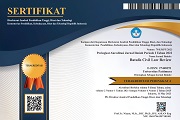Halal and Safe Food In Islamic Law
 )
)
(1) Faculty of Law Sultan Ageng Tirtayasa University, Banten, Indonesia
(2) Faculty of Law Sultan Ageng Tirtayasa University, Banten, Indonesia
 Corresponding Author
Corresponding Author
Abstract
The purpose of this research is to analyze and provide information to the public and to lawmakers that food is a primary need for every human being in terms of the halalness and safety of its products, it is a mandatory requirement for every consumer, especially Muslim consumers. Halal Food in Islamic Law explains about Halal Food or halal food in terms of aspects of Indonesian jurisprudence and Islamic law in Indonesia. Indonesia, which is a country with a predominantly Muslim population and is known for its very religious society, of course pays great attention to Islamic aspects in consuming food, namely halal food, both local production and imports from neighboring countries. The perspective of the basics of Islamic Law and Indonesian Law, especially regarding certification and labeling in the international trading system must receive strict attention in order to provide protection for Muslim consumers around the world, as well as a strategy to face the challenges of globalization. Lawmakers in Indonesia have made regulations related to this, namely Law Number 33 of 2014 concerning Guarantees for Halal Products (UUJPH). The method used in this study is using normative juridical methods by collecting data or information through library research, namely research conducted through literature studies via the internet and so on which are appropriate or have relevance to the problem being discussed. The results of this study state that the issue of halal and haram is very important and very urgent to be considered by all parties. The production chain from business actors to consumers is a concrete manifestation that must receive consumer protection by the state.
Keywords
DOI
10.47268/ballrev.v4i1.1310
Published
2023-05-02
How To Cite
@article{BALLREV1310,
author = {Palmawati Tahir and Muhamad Muslih},
title = {Halal and Safe Food In Islamic Law},
journal = {Batulis Civil Law Review},
volume = {4},
number = {1},
year = {2023},
keywords = {Halal Food; Consumers; Islamic Law},
abstract = {The purpose of this research is to analyze and provide information to the public and to lawmakers that food is a primary need for every human being in terms of the halalness and safety of its products, it is a mandatory requirement for every consumer, especially Muslim consumers. Halal Food in Islamic Law explains about Halal Food or halal food in terms of aspects of Indonesian jurisprudence and Islamic law in Indonesia. Indonesia, which is a country with a predominantly Muslim population and is known for its very religious society, of course pays great attention to Islamic aspects in consuming food, namely halal food, both local production and imports from neighboring countries. The perspective of the basics of Islamic Law and Indonesian Law, especially regarding certification and labeling in the international trading system must receive strict attention in order to provide protection for Muslim consumers around the world, as well as a strategy to face the challenges of globalization. Lawmakers in Indonesia have made regulations related to this, namely Law Number 33 of 2014 concerning Guarantees for Halal Products (UUJPH). The method used in this study is using normative juridical methods by collecting data or information through library research, namely research conducted through literature studies via the internet and so on which are appropriate or have relevance to the problem being discussed. The results of this study state that the issue of halal and haram is very important and very urgent to be considered by all parties. The production chain from business actors to consumers is a concrete manifestation that must receive consumer protection by the state.},
issn = {2746-8151}, pages = {37--50} doi = {10.47268/ballrev.v4i1.1310},
url = {https://fhukum.unpatti.ac.id/jurnal/ballrev/article/view/1310}
}
Adisasmito, W. (2008). Case Study: Analisis Kebijakan Nasional MUI dan BPOM dalam Labeling Obat dan Makanan. https://staff.blog.ui.ac.id/wiku-a/files/2009/02/kebijakan-nasional-mui-dan-bpom-dalam-labeling-obat-dan-makanan_edited.pdf
Hukum Online.com. (2014). UU Jaminan Produk Halal Berikan Kepastian Hukum Bagi Konsumen. Hukumonline.Com. https://www.hukumonline.com/berita/a/uu-jaminan-produk-halal-berikan-kepastian-hukum-bagi-konsumen-lt54241d9c5a5ed
kominfo.go.id. (2019). Pemerintah Siap Selenggarakan Jaminan Produk Halal. Kominfo.Go.Id. https://www.kominfo.go.id/content/detail/22210/pemerintah-siap-selenggarakan-jaminan-produk-halal/0/artikel_gpr
Kusnandar, V. B. (2021). RISSC: Populasi Muslim Indonesia Terbesar di Dunia. Databoks.Katadata.Co.Id. https://databoks.katadata.co.id/datapublish/2021/11/03/rissc-populasi-muslim-indonesia-terbesar-di-dunia
Lestari, T. R. P. (2020). Keamanan Pangan Sebagai Salah Satu Upaya Perlindungan Hak Masyarakat Sebagai Konsumen. Aspirasi: Jurnal Masalah-Masalah Sosial, 11(1), 57–72. https://doi.org/10.46807/aspirasi.v11i1.1523
Shihab, M. Q. (2002). Tafsir al-Misbah: Pesan, Kesan, dan Keserasian Al Qur’an. Lentera Hati.
Sukoso, Wiryawan, A., Kusnadi, J., & Sucipto. (2020). Ekosistem Industri Halal. Departemen Ekonomi dan Keuangan Syariah - Bank Indonesia Pusat Studi Halal Thoyyib - Universitas Brawijaya.
Cited-By:
1. Evaluation of an Ultra-Sensitive PCR Assay for Porcine Mitochondrial Cytochrome b Detection under Laboratory Conditions
Dita Larasati
Halal Science vol: 1 issue: 2 first page: 50 year: 2025
Type: Journal [View Source]
2. Halal challenges and health risks in genetically modified organisms (GMOs): a critical approach
Yedi Herdiana
Cogent Food & Agriculture vol: 11 issue: 1 year: 2025
Type: Journal [View Source]
| Dublin Core | PKP Metadata Items | Metadata for this Document | |
| 1. | Title | Title of document | Halal and Safe Food In Islamic Law |
| 2. | Creator | Author's name, affiliation, country | Palmawati Tahir; Faculty of Law Sultan Ageng Tirtayasa University, Banten; Indonesia |
| 2. | Creator | Author's name, affiliation, country | Muhamad Muslih; Faculty of Law Sultan Ageng Tirtayasa University, Banten; Indonesia |
| 3. | Subject | Discipline(s) | |
| 3. | Subject | Keyword(s) | Halal Food; Consumers; Islamic Law |
| 4. | Description | Abstract | The purpose of this research is to analyze and provide information to the public and to lawmakers that food is a primary need for every human being in terms of the halalness and safety of its products, it is a mandatory requirement for every consumer, especially Muslim consumers. Halal Food in Islamic Law explains about Halal Food or halal food in terms of aspects of Indonesian jurisprudence and Islamic law in Indonesia. Indonesia, which is a country with a predominantly Muslim population and is known for its very religious society, of course pays great attention to Islamic aspects in consuming food, namely halal food, both local production and imports from neighboring countries. The perspective of the basics of Islamic Law and Indonesian Law, especially regarding certification and labeling in the international trading system must receive strict attention in order to provide protection for Muslim consumers around the world, as well as a strategy to face the challenges of globalization. Lawmakers in Indonesia have made regulations related to this, namely Law Number 33 of 2014 concerning Guarantees for Halal Products (UUJPH). The method used in this study is using normative juridical methods by collecting data or information through library research, namely research conducted through literature studies via the internet and so on which are appropriate or have relevance to the problem being discussed. The results of this study state that the issue of halal and haram is very important and very urgent to be considered by all parties. The production chain from business actors to consumers is a concrete manifestation that must receive consumer protection by the state. |
| 5. | Publisher | Organizing agency, location | Faculty of Law, Universitas Pattimura |
| 6. | Contributor | Sponsor(s) | Faculty of Law Sultan Ageng Tirtayasa University, Banten |
| 7. | Date | (YYYY-MM-DD) | 2023-05-02 |
| 8. | Type | Status & genre | Peer-reviewed Article |
| 8. | Type | Type | |
| 9. | Format | File format | |
| 10. | Identifier | Uniform Resource Identifier | https://fhukum.unpatti.ac.id/jurnal/ballrev/article/view/1310 |
| 10. | Identifier | Digital Object Identifier | 10.47268/ballrev.v4i1.1310 |
| 11. | Source | Title; vol., no. (year) | Batulis Civil Law Review; Vol 4, No 1 (2023): VOLUME 4 ISSUE 1, MAY 2023 |
| 12. | Language | English=en | en |
| 13. | Relation | Supp. Files |
File word dari Halal And Safe Food In Islamic Law (401KB) |
| 14. | Coverage | Geo-spatial location, chronological period, research sample (gender, age, etc.) | |
| 15. | Rights | Copyright and permissions | Copyright: Authors who publish their manuscripts in this Journal agree to the following conditions: 1. The copyright in each article belongs to the author, as well as the right to patent. 2. Authors are able to enter into separate, additional contractual arrangements for the non-exclusive distribution of the journal's published version of the work (e.g., post it to an institutional repository or publish it in a book), with an acknowledgment of its initial publication in this journal. 3. Authors are permitted and encouraged to post their work online (e.g., in institutional repositories or on their website) prior to and during the submission process, as it can lead to productive exchanges, as well as earlier and greater citation of published work. 4. Authors have the right to self-archiving of the article (Author Self-Archiving Policy)
Licence : Batulis Civil Law Review Journal is disseminated based on the Creative Commons Attribution-NonCommercial 4.0 International license terms. This license allows anyone to copy and redistribute this material in any form or format, compose, modify, and make derivatives of this material for any purpose. You cannot use this material for commercial purposes. You must specify an appropriate name, include a link to the license, and certify that any changes have been made. You can do this in a way that is appropriate, but does not imply that the licensor supports you or your use.
|
Copyright (c) 2023 Palmawati Tahir, Muhamad Muslih

This work is licensed under a Creative Commons Attribution-NonCommercial 4.0 International License.
Cited-By:
1. Evaluation of an Ultra-Sensitive PCR Assay for Porcine Mitochondrial Cytochrome b Detection under Laboratory Conditions
Dita Larasati
Halal Science vol: 1 issue: 2 first page: 50 year: 2025
Type: Journal [View Source]
2. Halal challenges and health risks in genetically modified organisms (GMOs): a critical approach
Yedi Herdiana
Cogent Food & Agriculture vol: 11 issue: 1 year: 2025
Type: Journal [View Source]

 : 2332 times
: 2332 times Download : 1900 times
Download : 1900 times














